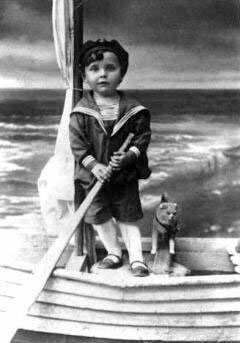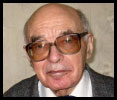David Bronstein, 1924–2006
By Frederic Friedel

David Bronstein at the age of 79 (Photo: Anne Fürstenberg)
David Ionovich Bronstein was born on February 19, 1924 in Bila Tserkva (near
Kiev) in Ukraine. He won international fame as a chess player at the 1948 Interzonals
and the Candidates Tournament in Budapest in 1950, where he defeated Boleslavsky
to become a challenger for the world title. He also married Boleslavsky's daughter
Tatiana.

A childhood picture of David Bronstein
Bronstein came agonizingly close to actually taking it from Botvinnik in Moscow's
Tchaikovsky Concert Hall, when he was leading by a full point up to game 22
(or 24). He lost game 23 and then drew 24 and the match, which left the incumbent
world champion Mikhail Botvinnik in place.

Rumours that Bronstein had been forced to lose the match persist until today
– they were, for instance, debated during the Kramnik vs Deep Fritz match
that ended on the day of his death. He himself wrote in his book "The
Sorcerer's Apprentice": "I have been asked many, many times if I was obliged
to lose the 23rd game and if there was a conspiracy against me to stop me from
taking Botvinnik's title. A lot of nonsense has been written about this. The
only thing that I am prepared to say about all this controversy is that I was
subjected to strong psychological pressure from various origins and it was
entirely up to me to yield to that pressure or not." Here's a full
ChessBase article on the fateful match and game.
In the same book he said “I had reasons not to become the World Champion,
as in those times such a title meant that you were entering an official world
of chess bureaucracy with many formal obligations. Such a position is not compatible
with my character.”

Vassily Smyslov, David Bronstein, Paul Keres and Mikhail Botvinnik, part
of the Soviet Olympiad team in Amsterdam 1954. Bronstein and Keres were, together
with Viktor Korchnoi and Bent Larsen, the stongest players not to have won
the world championship title.
When when Viktor Korchnoi defected from the Soviet Union in 1976 Bronstein
was one of the few Soviet grandmasters who refused to sign a letter denouncing
him. As punishment his stipend, a salary paid to all chess grandmasters in
the USSR, was suspended, and Bronstein was banned from competing in elite national
tournaments and from travelling abroad more than once a year.
David Bronstein was also a great chess writer, and his book on the Zurich
International Chess Tournament 1953 won great admiration, as did the Sorcerer's
Apprentice. Chess fans especially appreciated his habit of explaining
the ideas behind moves, instead of using the traditional method, which he called
"analysis of moves that never made it to the scoresheet." Bronstein
was also a pioneer in popularising the King's Indian Defence, which had been
considered dubious until he showed how to play it in his games and in a famous
book on the King's Indian.
On a personal note
David Bronstein continued to play chess at a very high level until late in
life. He became interested in computer chess and played in the Dutch Aegon
Mens-Computer Schaaktoernooi, which was staged every year in Den Haag
and pitted a team of computers against a team of human players. It was there
and on a few other occasions that I had the privilege to meet him and discuss
computers and their intrusion into the chess world with the great chess genius.
Bronstein was obsessed with certain endgames, like king, rook and four pawns
vs king, rook and three pawns, with three pawns on the kingside and White having
an extra passed pawn on b6, with his rook in front of the pawn. Yes, that's
how specific his interests could be. I remember David calling Ken Thompson
in New Jersey once, asking him if the computer scientist could analyse a position
with the endgame databases Ken had just created. Then he started dictating
the position, with Ken desperately calling "stop" at six pieces.
Bronstein's example contained about eleven, including pawns, which make the
position even more difficult. Ken said something like: "Sorry, we can't
do that. Maybe in a thousand years, but not at the current time."
David Ionovich was always talking about chess, and interestingly, as John
Nunn recalls, always about the future – about plans and projects he still
intended to undertake, rather than about his great past. On more than one occasion
I pestered him to tell me, in front of a video camera, what exactly had transpired
during his match against Botvinnik. He alway balked, and the closest I came
was to hear a "maybe someday". That day, unfortunately, will never
come.
Seirawan on Bronstein
In ChessBase Magazine 112 there are five interviews which I conducted with
GM Yasser Seirawan during a visit in Hamburg earlier this
year. Yasser was talking about his role as a new ChessBase multimedia commentator,
both on ChessBase Magazine as well as on the Playchess server.

In one segment Yasser told me about the Playchess lessons he was planning,
and how they would include famous players like – David Bronstein. In
this section Yasser told us a story which reveals the extraordinary personality
of this chess legend, with all the narrative skill that only someone like Yasser
can muster. You can watch the interview (in lower, compressed quality) here:
You can also get it in full quality, together with all the other material
on ChessBase Magazine 112, by buying the DVD (for US $22.87) in the ChessBase
Shop.
Links
New
York Times article by Dylan Loeb McClain on the death of David Bronstein.
You may need a (free) account to read it. Normally these articles also appear
in the International Herald Tribune.



























